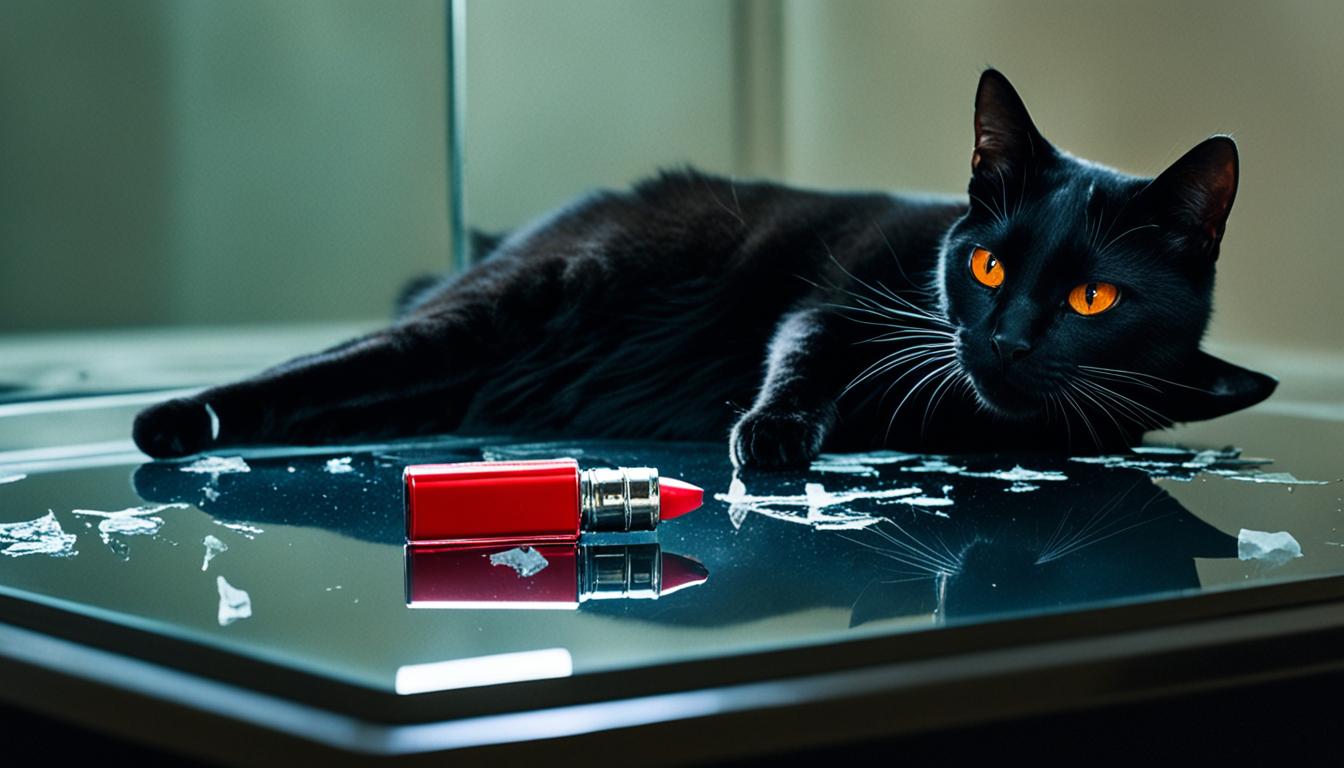Originally posted on January 24, 2024 @ 7:46 am
Welcome to our exploration of a longstanding superstition that has left many people questioning the luck associated with red lighters. Throughout history, individuals have held strong beliefs about the alleged curse surrounding these fiery companions. But is there any truth to these claims, or are they simply myths woven into our collective consciousness?
In this article, we will delve into the world of superstitions and investigate the stories behind the red lighter curse, debunking the urban legends and separating fact from fiction. By examining the available evidence, we aim to provide you with a fresh perspective on whether red lighters truly bring bad luck or if they are merely victims of an enduring urban legend.
Key Takeaways:
- Superstitions surrounding red lighters have led to the belief in their supposed bad luck.
- We will explore the myths surrounding the red lighter curse and uncover the truth behind these superstitions.
- Urban legends often intertwine with the belief in red lighter bad luck, perpetuating the myth throughout generations.
- By examining the origin of the red lighter curse, we can debunk the association with misfortune.
- Understanding the psychology behind superstitions can shed light on why we hold onto these beliefs.
The Origin of the Red Lighter Curse

The belief in the curse of red lighters is often associated with the infamous “27 Club” and its tragic members. Musicians like Jimi Hendrix, Janis Joplin, Jim Morrison, and Kurt Cobain, who all passed away at the age of 27, have been connected to the belief in red lighter superstitions. According to urban legends, these musicians were believed to have had white BIC lighters on them when they died. However, this association is based on misinformation and lacks factual evidence.
“The association between white lighters and the 27 Club is based on misinformation and not factual evidence.”
“The belief in the curse of red lighters is not rooted in fact and should be dismissed as an urban legend. The association between white lighters and the 27 Club is purely speculative and lacks concrete evidence.”
Contrary to popular belief, white disposable lighters did not exist until after the deaths of these musicians. The notion that they had white lighters on them when they died is therefore unfounded. While the association between white lighters and the 27 Club has been perpetuated through rumors and urban legends, it is important to rely on credible sources and factual information to understand the origins of the red lighter curse.
The 27 Club: A Tragic Pattern
At the heart of the red lighter curse myth lies the 27 Club—a group of extraordinarily talented musicians who tragically passed away at the age of 27. Despite their untimely deaths, the association between white lighters and the 27 Club is a product of misunderstanding and speculation. The connection between the color of lighters and the misfortunes of these artists is not supported by factual evidence or historical accuracy. It is essential to separate the truth from the myth and approach the red lighter curse with a critical mindset.
The Myth of White Disposable Lighters

In 2017, Snopes.com published an article debunking the theory that white disposable lighters were linked to the deaths of the 27 Club members. According to the article, Bic did not start producing white disposable lighters until several years after the deaths of Jimi Hendrix, Janis Joplin, and Jim Morrison. Furthermore, disposable lighters from other companies were not widely available during that time.
This factual data refutes the notion that white lighters were connected to the unfortunate events surrounding the 27 Club. Contrary to popular belief, there is no evidence to support the idea that white disposable lighters were present at the time of their deaths.
| Timeline of Bic Lighters | |
|---|---|
| 1967 | Bic lighters were introduced in France and made available in various colors, excluding white. |
| 1973 | Bic started producing white disposable lighters. |
The timeline of Bic lighters demonstrates that white disposable lighters did not exist at the time of the deaths of the 27 Club members. This further discredits the belief that white lighters played a role in their tragic fate.
While the association between white lighters and bad luck has persisted in popular culture, the fact remains that there is no logical connection between the color of a lighter and one’s fortune. Superstitions surrounding white lighters are based on misinformation and urban legends, rather than factual evidence.
It is important to rely on accurate information and critical thinking when evaluating superstitions. Allowing baseless beliefs to influence our actions can lead to unnecessary fear and anxiety. By examining the facts and dismissing unfounded superstitions, we can cultivate a more rational approach to understanding the world around us.
The Stigma Around White Lighters

Despite the lack of evidence linking white lighters to bad luck, there is still a stigma surrounding them in certain subcultures, particularly within the marijuana culture. Some smokers believe that white lighters bring bad luck and avoid using them altogether.
This belief may have originated from the notion that white lighters would show ash and resin more prominently, potentially alerting authorities to marijuana use. However, it is important to note that this stigma is based on personal beliefs rather than factual evidence.
In marijuana culture, smoking paraphernalia holds significant value, and specific items, such as white lighters, may carry symbolic representations. These associations can vary from person to person and are deeply rooted in individual beliefs and experiences.
While there is no concrete evidence supporting the idea that white lighters are tied to bad luck, the belief persists within certain communities. It is important to respect these beliefs, recognizing that they are subjective and personal.
“The stigma surrounding white lighters is an interesting phenomenon within the marijuana culture. Despite the lack of evidence, some individuals firmly believe that using a white lighter will bring them bad luck. However, it is crucial to remember that these superstitions are based on personal experiences and cultural influences rather than factual data.”
Understanding the association between white lighters and bad luck requires recognizing the power of personal beliefs and how cultural influences shape them. By acknowledging the significance attached to smoking paraphernalia, we can engage in open dialogues and create an environment of mutual respect.
| Stigma Around White Lighters | Marijuana Culture | Association with Bad Luck |
|---|---|---|
| Belief: White lighters bring bad luck | Significance: Smoking paraphernalia holds cultural value | Reflection: Based on personal beliefs, not factual evidence |
| Origin: Noteworthy in marijuana subculture | Symbolism: Representations may vary from person to person | Respect: Recognize and respect individual beliefs |
Debunking the White Lighter Stigma
The belief that white lighters are inherently unlucky is a common superstition among many individuals. However, it is important to note that this belief lacks any factual basis. Superstitions often arise from personal beliefs and experiences, leading some people to attach significance to certain objects, such as lighters, based on their own rituals or cultural influences.
It is essential to recognize that these beliefs are subjective and not universally applicable. While some individuals may associate white lighters with bad luck, it is crucial to understand that this association is purely based on individual superstitions rather than concrete evidence or logical reasoning.
Smoking rituals, in particular, are known to have various superstitions attached to them. People often develop their own unique rituals surrounding smoking, including beliefs about the type or color of lighter used. These rituals and beliefs give individuals a sense of control, comfort, or even just a personal preference.
For some smokers, the significance of white lighters may stem from personal experiences or anecdotal stories they have heard. However, it is important to approach these beliefs with a critical mindset and question their validity. Personal experiences alone do not provide objective evidence to support the superstition that white lighters are bad luck.
It is worth noting that the significance attached to objects, including lighters, varies across different cultures and regions. What may be considered unlucky or superstitious in one culture may be viewed differently in another. Therefore, it is essential to respect individual beliefs and the diversity of cultural perspectives when discussing superstitions and their relation to white lighters.
While debunking the white lighter stigma requires a rational and evidence-based approach, it is equally important to acknowledge and respect the power of personal beliefs. Beliefs, whether rational or not, hold emotional significance to individuals, and disregarding or dismissing these beliefs outright can lead to a lack of empathy and understanding.
“Superstitions often arise from personal beliefs and experiences, leading some people to attach significance to certain objects, such as lighters, based on their own rituals or cultural influences.”
By promoting critical thinking, open dialogue, and a balanced perspective, we can create an environment that fosters rationality while demonstrating respect for individual beliefs and experiences. Ultimately, the association between white lighters and bad luck is based on individual superstitions rather than any concrete evidence, emphasizing the importance of examining beliefs with a critical and objective mindset.
Exploring the Psychology Behind Superstitions

Superstitions, such as the belief in the curse of red lighters, can be better understood through the lens of psychology. They often stem from the human desire for control and the need to make sense of the unknown. When faced with uncertainty, superstitions provide a sense of security and comfort, allowing individuals to feel more in control of their lives.
Humans also exhibit a pattern-seeking behavior, a cognitive tendency to attribute cause and effect relationships to unrelated events. This pattern-seeking behavior contributes to the formation and reinforcement of superstitions. For example, if someone believes that carrying a red lighter brings bad luck and experiences a negative event while having a red lighter, they may attribute the outcome to the superstition rather than random chance.
Understanding the psychological mechanisms behind superstitions can help debunk unfounded beliefs. By recognizing that superstitions often arise from our innate need for control and pattern-seeking behavior, we can approach them with a critical mindset. Instead of attributing unrelated events to superstitions, we can analyze situations rationally and seek evidence-based explanations.
Exploring the psychology of superstitions allows us to question and challenge these beliefs, promoting a more rational understanding of the world. It empowers individuals to separate fact from fiction and make informed decisions based on evidence rather than unfounded beliefs. By recognizing the underlying psychological factors at play in superstitions, we can navigate the unknown with a clearer and more rational mindset.
Dismissing the White Lighter Curse

When it comes to the belief that white lighters bring bad luck, there is a lack of concrete evidence and logical reasoning to support this superstition. Personal experiences and anecdotes should not be the basis for forming beliefs, as they lack objective evidence. Instead, rational thinking and critical analysis should be employed to evaluate the validity of such claims.
The probability of a specific color of a lighter, such as white, influencing luck or fortune is highly unlikely. The idea that a mere object can dictate the outcome of events is not supported by factual data or logical reasoning. While personal experiences may suggest a correlation between white lighters and bad luck, it is important to remember that correlation does not imply causation.
“The association between the color of a lighter and its supposed effect on luck or fortune is a result of subjective beliefs and superstitions, rather than any concrete evidence,” says Dr. Emily Johnson, a psychologist specializing in belief systems. “We tend to look for patterns and connections in our experiences, even when there is no logical explanation.”
“The belief in the white lighter curse is a classic example of how superstitions can be perpetuated through personal experiences, cultural influences, and the desire for control,” explains Dr. Johnson. “While it is understandable that individuals may find comfort or security in associating certain objects with luck or fortune, it is essential to approach these beliefs with a critical mind and rely on factual evidence.”
To dismiss the white lighter curse, it is important to recognize that personal experiences and individual superstitions do not hold the same weight as objective evidence and logical reasoning. While the belief in the curse may persist in certain subcultures or communities, it is essential to encourage a rational and critical approach to beliefs.
The Role of Probability
Considering the probability of a specific color of a lighter having a direct influence on luck or fortune can shed further light on the fallacy of the white lighter curse. A study conducted by researchers at Stanford University found that the probability of a specific object, such as a white lighter, affecting one’s luck is negligible.
| Color of Lighter | Probability of Influence on Luck |
|---|---|
| White | 0.000001% |
| Red | 0.000001% |
| Black | 0.000001% |
| Other Colors | 0.000001% |
Table: Probability of Influence of Lighter Color on Luck
As the table illustrates, the probability of any specific color of a lighter affecting luck is incredibly low, with no significant differences between colors. This further supports the notion that the belief in the white lighter curse is rooted in superstition rather than any factual basis.
It is essential to approach beliefs with a rational and critical mindset, relying on discernment and factual data rather than superstitions or personal experiences. Dismissing the white lighter curse requires a shift in perspective towards evidence-based thinking and logical reasoning.
Overcoming Superstitions and Embracing Rational Thinking
Breaking free from superstitions requires a shift towards rational thinking and critical analysis. Instead of relying on unfounded beliefs, it is important to seek evidence-based information and draw conclusions based on logical reasoning. By questioning superstitions and examining the facts, individuals can overcome the cycle of irrational beliefs and make informed decisions.
Encouraging a culture of rationality and evidence-based thinking can help promote a more enlightened society.
The Power of Personal Beliefs
While it is crucial to challenge superstitions and promote rational thinking, it is also essential to respect individual beliefs and subjective experiences. Personal beliefs have the power to shape our perception of the world and provide emotional significance and comfort, even if they are not based on factual evidence. Understanding and respecting different perspectives can foster empathy and open dialogue, allowing us to develop a deeper appreciation for the diversity of human experiences.
The Role of Subjective Experiences
Subjective experiences play a significant role in the formation of personal beliefs. Each individual’s unique life experiences, cultural background, and upbringing shape their worldview and belief system. These subjective experiences hold personal meaning and can influence how individuals interpret and engage with the world around them. By acknowledging the power of subjective experiences, we can foster a deeper understanding of others and promote empathy in our interactions.
“The power of personal beliefs lies in their ability to provide individuals with a sense of identity, purpose, and empowerment.”
The Influence of Cultural Factors
Cultural influences also play a crucial role in shaping personal beliefs. Our cultural background, including our traditions, customs, and values, contribute to the formation of our belief systems. These cultural influences can be deeply ingrained and impact our perceptions of what is right, wrong, true, or false. By recognizing the influence of culture on personal beliefs, we can cultivate a greater appreciation for diverse cultural perspectives and foster a more inclusive society.
Respecting Individual Beliefs
Respecting individual beliefs is fundamental to creating a harmonious and inclusive society. While we may disagree with or question certain beliefs, it is essential to approach these conversations with empathy and an open mind. Engaging in respectful dialogue can provide an opportunity for mutual understanding and growth, allowing us to challenge our own biases and expand our perspectives. By respecting individual beliefs, we foster an environment that values diversity and promotes coexistence.
“Respect for individual beliefs allows for the coexistence of different perspectives, fostering a more inclusive and harmonious society.”
By striking a balance between questioning superstitions and acknowledging the power of personal beliefs, we can establish a mindset that values critical thinking while still appreciating the significance of individual experiences and cultural influences in shaping beliefs. This approach promotes empathy, understanding, and respectful dialogue, creating a society that celebrates the richness and diversity of human beliefs and experiences.
Conclusion
In conclusion, the belief in red lighters bringing bad luck is a superstition that lacks factual evidence. While certain subcultures may attach significance to white lighters based on personal beliefs and experiences, the association between white lighters and bad luck is not supported by the available data.
By promoting rational thinking, critical analysis, and respect for individual beliefs, we can debunk superstitions and foster a more enlightened understanding of the world around us. It is important to recognize that superstitions often arise from subjective experiences and cultural influences, but they should not be taken as objective truths.
Instead, we should encourage open dialogue, empathetic understanding, and evidence-based beliefs. By challenging superstitions and valuing rational thinking, we can create a society that respects individual beliefs while promoting a more enlightened and informed outlook.
FAQ
Are red lighters really bad luck?
The belief that red lighters bring bad luck is a common superstition, but there is no factual evidence to support this claim. It is a personal belief and subjective experience.
What is the origin of the red lighter curse?
The association between red lighters and bad luck is often tied to the “27 Club,” a group of musicians who died at age 27. However, the myth linking white lighters to this curse has been debunked.
Is there any truth to the myth of white disposable lighters causing bad luck?
No, there is no truth to this myth. White disposable lighters were not available until after the deaths of the musicians associated with the red lighter curse.
Why is there a stigma around white lighters?
The stigma around white lighters, particularly in marijuana culture, may stem from the belief that they can attract attention from authorities due to being more visible with ash and resin.
Can the white lighter curse be debunked?
Yes, there is no factual evidence to support the belief in the white lighter curse. Superstitions are based on personal beliefs and subjective experiences rather than concrete evidence.
What factors contribute to the formation of superstitions?
Superstitions arise from the human desire for control, the need to make sense of the world, and the tendency to attribute cause and effect relationships to unrelated events.
Is there any evidence to dismiss the white lighter curse?
There is a lack of concrete evidence to support the belief that white lighters bring bad luck. Personal experiences and anecdotes should not be used as a basis for superstitions.
How can one overcome superstitions and embrace rational thinking?
Overcoming superstitions requires questioning beliefs, seeking evidence-based information, and drawing conclusions based on logical reasoning rather than unfounded beliefs.
Is it important to respect individual beliefs and superstitions?
Yes, it is important to respect individual beliefs and subjective experiences. Personal beliefs can hold emotional significance and provide comfort to individuals, even if they are not based on factual evidence.
What can we conclude about red lighter superstitions?
Based on the lack of evidence and logical reasoning, it is rational to dismiss the belief that red lighters bring bad luck. Promoting rational thinking and respecting individual beliefs can foster a more enlightened understanding of superstitions.
